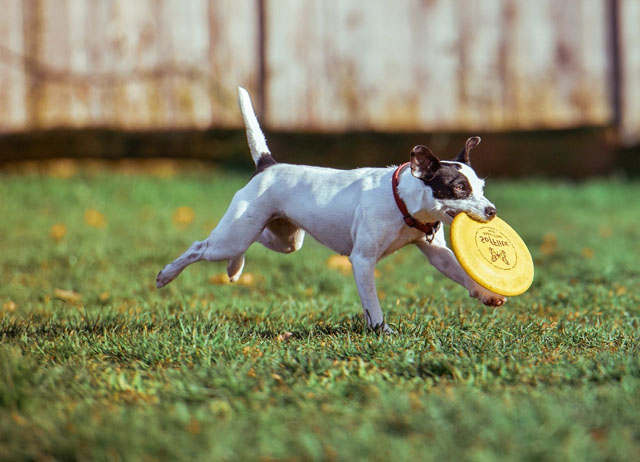



One of the most important positive habits for dogs is daily exercise. Dogs are naturally active animals and need regular physical activity to stay healthy and happy. Daily exercise helps to burn off excess energy, maintain a healthy weight, and prevent behavioral problems caused by boredom or pent-up energy.
Experts recommend at least 30 minutes to 1 hour of exercise every day for most dogs. This can include activities such as walking, running, playing fetch, or participating in dog sports like agility or obedience training. The type and intensity of exercise should be tailored to your dog's age, breed, and overall health.
By incorporating daily exercise into your dog's routine, you are not only promoting their physical well-being but also providing mental stimulation and an outlet for their natural instincts.
Establishing regular meal times is another positive habit that can benefit your dog's overall health and well-being. Dogs thrive on routine, and having set meal times helps to regulate their digestion and prevent overeating.
Feed your dog at the same time each day, ideally in a quiet and calm environment. This will help them develop a sense of predictability and reduce anxiety around meal times. It's also important to provide a balanced and nutritious diet that meets your dog's specific dietary needs.
By maintaining regular meal times, you can prevent obesity, digestive issues, and other health problems associated with irregular feeding schedules.
Just like humans, dogs need mental stimulation to keep their minds sharp and engaged. Providing mental stimulation is a positive habit that can prevent boredom, destructive behavior, and anxiety in dogs.
There are various ways to provide mental stimulation for your dog. Puzzle toys, interactive feeders, and treat-dispensing toys can keep them entertained and mentally challenged. Training sessions, obedience classes, and learning new tricks also provide mental stimulation and strengthen the bond between you and your dog.
Additionally, incorporating scent games, hide-and-seek, and other interactive playtime activities can stimulate your dog's senses and keep them mentally engaged.
Socialization is a crucial aspect of a dog's life. It involves exposing them to different people, animals, environments, and experiences in a positive and controlled manner. Socialization helps dogs develop confidence, good manners, and the ability to adapt to new situations.
Make it a habit to expose your dog to various socialization opportunities from a young age. This can include visits to dog parks, playdates with other friendly dogs, and supervised interactions with different people. Gradually expose your dog to new environments, sounds, and experiences to help them become well-rounded and confident.
Remember to always prioritize your dog's safety and comfort during socialization. Positive experiences and interactions will help your dog develop positive associations and reduce the likelihood of fear or aggression towards new situations.
Consistent training is an essential positive habit for dogs. Training provides mental stimulation, establishes boundaries, and helps dogs understand what is expected of them in different situations.
Set aside regular training sessions to work on basic obedience commands such as sit, stay, come, and leash walking. Use positive reinforcement techniques such as treats, praise, and rewards to motivate and encourage your dog during training.
Consistency is key when it comes to training. Use the same cues and rewards consistently, and practice training in different environments to generalize the learned behaviors. Remember to keep training sessions short and fun to maintain your dog's interest and enthusiasm.
Grooming is not only about keeping your dog looking good but also plays a vital role in their overall health and well-being. Regular grooming sessions help maintain healthy skin and coat, prevent matting and tangling, and allow you to check for any signs of skin issues or parasites.
Make grooming a positive experience for your dog by introducing them to grooming tools and procedures gradually. Use positive reinforcement and rewards to create a positive association with grooming sessions. Start with short sessions and gradually increase the duration as your dog becomes more comfortable.
Grooming tasks can include brushing their coat, cleaning their ears, trimming their nails, and brushing their teeth. Regular grooming not only keeps your dog looking their best but also helps prevent health issues and strengthens the bond between you and your furry friend.
Just like humans, dogs need quality sleep to recharge and stay healthy. Establishing a consistent sleep routine is a positive habit that promotes your dog's overall well-being.
Create a comfortable and quiet sleeping area for your dog, preferably in a location where they feel safe and secure. Provide a cozy bed or crate and ensure the room is at a comfortable temperature. Avoid disturbances during their sleep time and establish a consistent bedtime routine.
The amount of sleep required varies depending on the dog's age, breed, and activity level. Puppies and younger dogs generally require more sleep, while older dogs may need more frequent naps. Observe your dog's sleep patterns and adjust their routine accordingly.
Regular health check-ups are essential for maintaining your dog's overall health and detecting any potential health issues early on. Make it a habit to schedule regular visits to the veterinarian for routine vaccinations, preventive care, and wellness exams.
During these check-ups, the veterinarian will assess your dog's overall health, perform necessary tests, and provide any required vaccinations or treatments. They can also offer advice on nutrition, exercise, and any specific health concerns related to your dog's breed or age.
By prioritizing regular health check-ups, you can ensure your dog receives the necessary preventive care and early intervention, leading to a longer and healthier life.
Playtime is not only fun for dogs but also an important way to bond with their owners. Regular play sessions provide physical exercise, mental stimulation, and strengthen the bond between you and your dog.
Set aside dedicated playtime each day to engage in interactive games and activities with your dog. This can include playing fetch, tug-of-war, or simply running around in the backyard. Use toys and treats to make playtime more exciting and rewarding for your dog.
Playtime is also an opportunity to reinforce training commands and practice obedience in a fun and engaging way. It allows you to observe your dog's behavior, monitor their energy levels, and address any behavioral issues that may arise.
Positive reinforcement is a powerful tool for shaping your dog's behavior and promoting positive habits. It involves rewarding desired behaviors with praise, treats, or other rewards, while ignoring or redirecting unwanted behaviors.
Make it a habit to use positive reinforcement techniques during training, daily interactions, and when addressing behavioral issues. Reward your dog for good behavior, such as following commands, being calm, or displaying appropriate social behavior.
Avoid punishment-based training methods, as they can lead to fear, anxiety, and aggression in dogs. Instead, focus on rewarding and reinforcing positive behaviors to create a strong bond of trust and respect with your dog.
By incorporating these positive habits and routines into your dog's daily life, you can ensure their physical and mental well-being, strengthen your bond, and promote a happy and fulfilling life for your furry friend.
Leave a Reply
Related posts